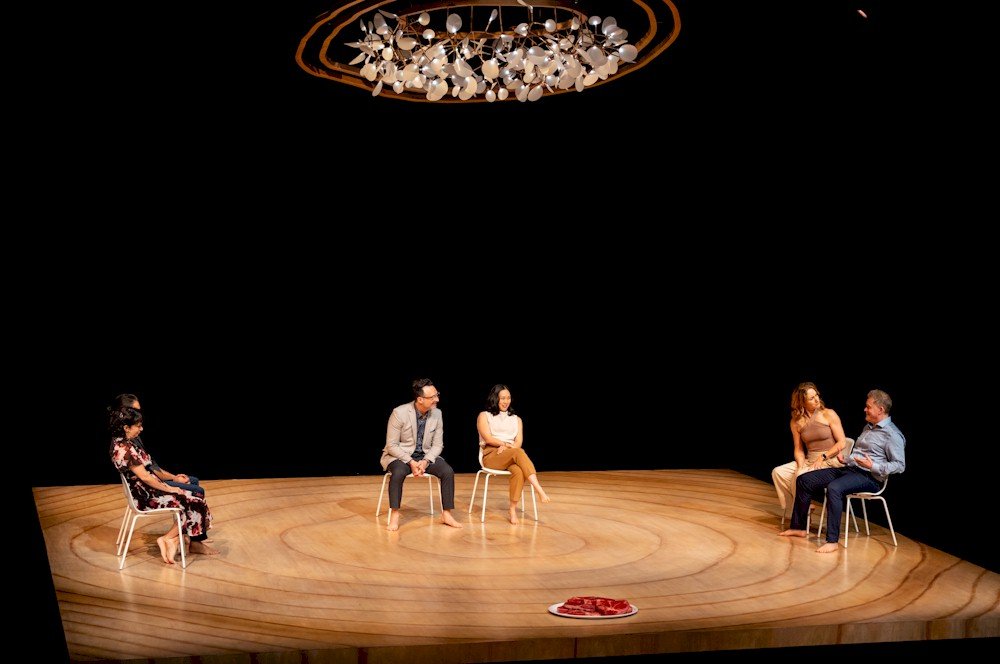Theatre review: The Cull delivers focused performances in its look at people's varying moral compasses
Director Mindy Parfitt’s take on the play by Michele Riml and Michael St. John Smith spotlights its humanist-oriented dialogue
The cast of The Cull, 2023: set design by Amir Ofek; costume design by Alaia Hamer; lighting design by Ted Roberts; photo by Moonrider Productions for the Arts Club Theatre Company
Arts Club Theatre Company presents The Cull to February 26 at Granville Island Stage
LIFE DOESN’T ALWAYS go according to plan, and neither do some dinner parties. The gathering in Michele Riml and Michael St. John Smith’s The Cull is one of those occasions that go off the rails. As the night progresses, things get messy in more ways than one.
In the play—which is having its world premiere and is directed by Mindy Parfitt—three middle-aged married couples, friends who go way back, meet up at the 12,000-square-foot Okanagan home of Paul (Craig Erickson) and Nicole (Meghan Gardiner). They’re celebrating the 25th wedding anniversary of high-school sweethearts Emily (Dawn Petten) and Lewis (Stephen Lobo) along with John (John Cassini) and Lynne (Jasmine Chen).
Paul maintains his family’s affluent lifestyle by working the stock market, while Nicole takes care of their two school-age kids when she’s not out training for a half-marathon or shopping for things like bamboo napkins and beautiful furnishings. Lewis is a skilled woodworker who gets by on odd jobs. He and Em have trouble making ends meet and barely made last month’s rent; they have two kids, one a young adult who struggles with mental health. Their circumstances are a world away from those of Lynne (Jasmine Chen) and John (John Cassini), the latter of whom has somehow amassed a fortune and has the ability to write huge cheques at the drop of a hat. Childless, Lynne and John are in the beginning stages of building a 30-unit eco-tourism resort on her orchard property. Yes, their problems are first-world.
Once all of the guests have arrived, host Nicole tries to set out the night’s only rules: no cellphones (they’re to get tossed in a basket) and no talk of politics or business. You can guess where this is going: not only do politics and business get discussed, but, as a forest fire burns nearby, so do hot topics like the climate crisis (and their own complicity in it) and B.C.’s controversial wolf cull. A dark personal secret is revealed; a deal is put on the table; and it becomes clear that things with Paul and Nicole are not as they seem. Light-hearted conversation devolves into confessions, accusations, and moral judgments. Throughout, there are a few metaphorical references to the social and familial structure of wolf packs and to the apex predators’ intelligence and loyalty.
The playwrights have cast a wide net with so much ground to cover. At just over two hours, the play, just like a dinner party, takes some time to cut through the small talk to get to the juicy stuff. And while the script sometimes meanders, particularly in the first act, the humanist-oriented dialogue is not just the work’s greatest strength; it is the play.
Parfitt orchestrates the piece in a unique way through spareness. In Amir Ofek’s masterful set design, the stage is a rotating platform, the surface of which resembles a tree trunk cut horizontally to show its rings; hanging high above is a grand chandelier made of two wooden rings surrounding dozens of illuminated, translucent white petals. Other than that, the only set pieces at the outset are a platter of large steaks on the floor and six white chairs. The pals make their way from appetizers (crackers with quince jelly) to the main course (the finest steak Paul can find along with organic asparagus and mushrooms) and dessert (a Thomas Haas chocolate cake). But when the actors say lines like “pass me your plate” or “pour the wine”, they aren’t actually doing any of the actions; in a way, it’s as if we’re watching them perform The Cull’s original pandemic-induced format of an audio play.
It’s refreshing to have the words and the story take centre-stage. If there’s excess in more than half of these characters’ lives, there certainly isn’t any in Parfitt’s approach. This deliberate sparseness gives added weight to the work’s emotional undercurrent and prevents nuances from going unnoticed. It underlines the escalating tension not only between Paul and Nicole but in other relationships; conversations among the group spin off into various one-on-ones, some of which are prickly, one of which is lecherous.
Parfitt’s take on The Cull demands authoritative performances, and the cast delivers. While all six characters are at their most impassioned in the second half (each in their own way), Petten’s Emily wins over viewers from the get-go with her genuineness. Petten makes the woman who was pregnant at 17 believable, especially when, wiping away tears, she says she can be disappointed by life but still feel grateful at the same time. Emily and Lewis are the play’s most relatable characters (at least for viewers who don’t run with Lynne and John’s high-net-worth kind of crowd), Petten and Lobo evenly conveying their down-to-earth personalities and practicality. As Lewis, who’s deeply connected to nature and to his own values (and who has a keen understanding of wolves), Lobo brings a no-bullshit warmth. It’s hard to find sympathy for the other four characters, with their immense privilege and blatant material aspirations; however, opposite Erickson’s brusque Paul, Gardiner’s Nicole digs deep into her vulnerability, lost in her sense of self and purpose as she questions her own decisions. What it means to be a decent human being comes up a lot, with Cassini’s John getting the most insightful related lines; even though he’s kind of an asshole, he’s willing to admit there’s only so much this group will do to save the environment if it means giving up their own comforts.














